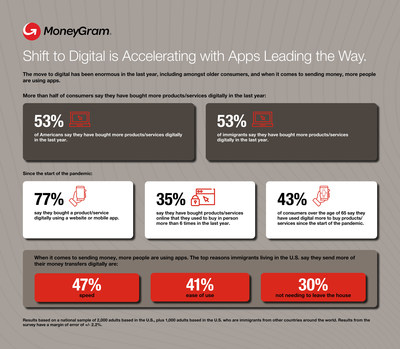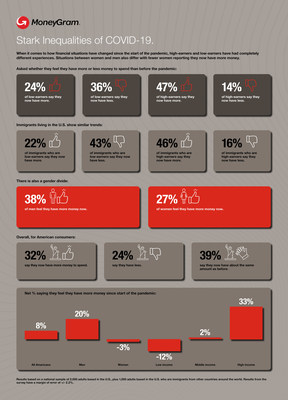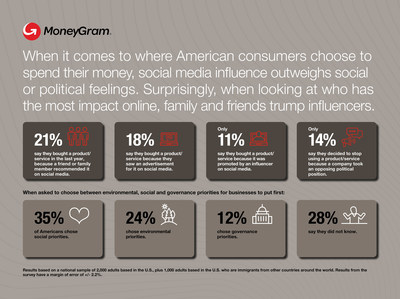Significant Shift in Consumer Behavior Reveals Implications for Brands to Accelerate Transformations Coming Out of the Pandemic, According to New MoneyGram Data Index
DALLAS, May 26, 2021 /PRNewswire/ -- The past year has created a dramatic shift in consumer behavior that has forever changed the retail environment to be more digital and customer-centric. MoneyGram, a global leader in the evolution of digital P2P payments, today announced the results of its first-ever MoneyGram Data Index1 – a national poll focused on how consumer behavior and expectations toward companies have evolved since the start of the COVID-19 pandemic. The data shows that everything from how consumers spend and send money to how they interact with brands has changed in this new normal. The following trends highlight the importance for direct-to-consumer brands and financial services firms to adapt their strategies to emerge from the pandemic even stronger.
The MoneyGram Data Index reveals that convenience is the key driver of value and main reason consumers would be willing to pay more for a product or service, and the shift to digital is accelerating with more than half of consumers saying they have bought more products and services digitally in the last year. When it comes to how financial situations have changed, the findings also tap into the stark inequalities between high-earners and low-earners – especially in the immigrant community. Situations between women and men also differ with fewer women reporting they now have more money.
Lastly, the influence of social media – particularly through family and friends online – outweighs social or political feelings. The data highlights the influence of social media with one in five consumers saying they bought a product or service in the last year because a friend or family member – rather than an influencer – recommended it on social media. However, despite enflamed political commentary over the past year, few consumers say they decided to stop using a product or service because a company took an opposing political position.
"The COVID-19 pandemic has truly accelerated a shift in consumer behavior, and we expect these trends to be permanent as consumers of all ages value digital-first convenience from brands," said Alex Holmes, MoneyGram Chairman and CEO. "In an age where companies have entered the political debate more than ever before, the importance of family and friends remains paramount – especially within the immigrant community who report that they continue to send more money to support living expenses of those abroad. As MoneyGram continues to build upon the momentum in our direct-to-consumer channel, our focus on consumer insights will ensure our company continues to thrive in this new, forever changed retail environment."
The MoneyGram Data Index: By the Numbers
Surge in sending money during the pandemic:
Shift to Digital is Accelerating with Apps Leading the Way: The move to digital has been enormous in the last year, including amongst older consumers, and when it comes to sending money, more people are using apps.
- More than half (
53% ) of consumers say they have bought more products/services digitally in the last year. This percentage holds steady with immigrants living in the U.S.,53% of whom say they have bought more products/services digitally in the last year. - Since the start of the pandemic, three out of four consumers (
77% ) say they bought a product/service digitally – using a website or mobile app. - More than one in three consumers (
35% ) say they have bought products/services online that they used to buy in person more than 6 times in the last year. 43% of consumers over the age of 65 say they have used digital more to buy products/services since the start of the pandemic.- Convenience and delivery are two of the main benefits of digital and the main reasons American consumers would be willing to pay more for a product or service.
54% say they would pay more for a product/service that is convenient, and53% say they would pay more for something that is delivered to their door. - When it comes to sending money, more people are using apps. Amongst immigrants living in the U.S., the top reason they say they send more of their money transfers digitally is speed (
47% ), followed by ease of use (41% ), and not needing to leave the house (30% ).
Stark Inequalities of COVID-19: When it comes to how financial situations have changed since the start of the pandemic, high-earners and low-earners have had completely different experiences – especially in the immigrant community. Situations between women and men also differ with fewer women reporting they now have more money.
- Asked whether they feel they have more or less money than before the pandemic, only one in four (
24% ) low-earners say they now have more, while36% say they now have less. - On the other hand, almost one in two (
47% ) high-earners say they are better off financially since the start of the pandemic, while only14% say they now have less money. - Immigrants living in the U.S. show similar trends.
22% of immigrants who are low-earners say they now have more money, while43% say they now have less. On the other hand,46% of immigrants who are high-earners say they now have more, while only16% say they now have less. - When it comes to gender, there is also a divide. Almost four in ten men (
38% ) feel they have more money now, but for women, this number is closer to one in four (27% ). - Overall, for Americans, one-third of consumers (
32% ) say they now have more money,24% say they have less, and39% say they now have about the same amount as before.
Social Media Outweighs Social or Political Feelings: When it comes to where American consumers choose to spend their money, social media influence outweighs social or political feelings. Surprisingly, when looking at who has the most impact online, family and friends trump influencers.
- More consumers say they were swayed by family or friends on social media than by influencers. One in five consumers (
21% ) say they bought a product/service in the last year because a family member or friend recommended it on social media, while only11% say they bought a product/service because an influencer promoted it on social media. - Despite enflamed political commentary over the past year, including numerous calls to boycott companies for a variety of political or social positions, only
14% of consumers say they decided to stop using a product/service because a company took an opposing political position. - Though ESG is not a top factor in making purchasing decisions, out of the three components, the 'S' is most important to consumers. When asked to choose between environmental, social and governance priorities for businesses to put first,
35% of Americans chose social priorities, while24% chose environmental priorities. Only12% opted for governance priorities, while28% said they do not know.
1Survey Methodology
MoneyGram partnered with Kekst CNC to field the MoneyGram Data Index nationally. This poll was conducted between April 12-30, 2021, among a national sample of 2,000 adults based in the U.S., plus 1,000 adults based in the U.S. who are immigrants from other countries around the world. The interviews were conducted online, and the data was weighted to approximate a target sample of adults based on age, race/ethnicity, gender, educational attainment, region and country of origin. Results from the full survey have a margin of error of plus or minus 2.2 percentage points.
About MoneyGram International, Inc.
MoneyGram is leading the evolution of digital P2P payments. With a purpose-driven strategy to mobilize the movement of money, a strong culture of fintech innovation, and leading customer-centric capabilities, MoneyGram has grown to serve nearly 150 million people across the globe over the last five years.
The Company leverages its modern, mobile, and API-driven platform and collaborates with the world's leading brands to serve consumers through MoneyGram Online (MGO), its direct-to-consumer digital business, its global retail network and its emerging embedded finance business for enterprise customers, MoneyGram as a Service.
For more information, please visit ir.moneygram.com and follow @MoneyGram.
Media Contact
Stephen Reiff
media@moneygram.com
![]() View original content to download multimedia:http://www.prnewswire.com/news-releases/significant-shift-in-consumer-behavior-reveals-implications-for-brands-to-accelerate-transformations-coming-out-of-the-pandemic-according-to-new-moneygram-data-index-301299477.html
View original content to download multimedia:http://www.prnewswire.com/news-releases/significant-shift-in-consumer-behavior-reveals-implications-for-brands-to-accelerate-transformations-coming-out-of-the-pandemic-according-to-new-moneygram-data-index-301299477.html
SOURCE MoneyGram











